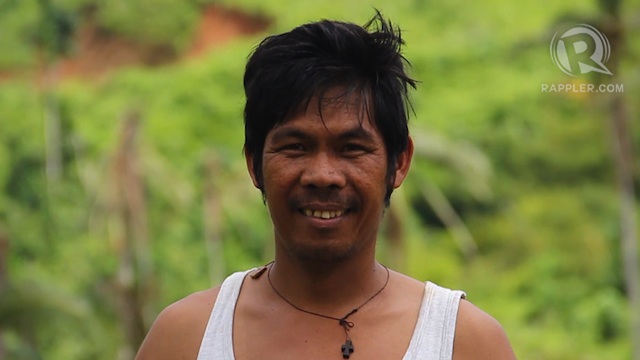SUMMARY
This is AI generated summarization, which may have errors. For context, always refer to the full article.

(Editor’s note: Our visit to Compostela Valley and Davao Oriental was organized by the World Food Programme-Philippines.)
ARAGON, Davao Oriental – Elbert Reyes would like his children to work in an office. In an office, storms do not matter, the hot sun will not matter, and the pay will always be better.
Elbert himself never finished high school. He can read and count and write, but he will never work in an office with an air conditioner. He is a farmer, like his father before him, and he will plant what he can while he can so someday his children will not have to plant at all.
One day, on the 4th of December, 2012, a typhoon swept over Cateel in Davao Oriental. Elbert knew it was coming, but like most of the people born and raised in the small town of Aragon, he did not believe there was any danger.
When it came, the sound was like buses trundling down the road. Elbert ran home. The rain ripped sideways. The wind blew black. Elbert and his family crouched inside the small bathroom of their house. They thought they were going to die.
The roof went first, then the walls. When it was over, 4 hours later, all that was left was the bathroom with Elbert’s family crouched inside.
End of the world
Outside, the neighbors were crying. The coconut trees were broken, houses flattened. Crops floated under a foot of water. The people were alive, but their world had ended.
Aragon registered one death, one man out of the 1,099 that perished in the storm of December 4. More than 600 remain missing. According to the World Food Program, Pablo damaged 73% of coconut fields and more than 72% of the banana plantations sustaining Davao Oriental and Compostela Valley.
In Aragon, the aid came 3 days after Typhoon Pablo. Elbert, vice president of the Aragon Vegetable Growers Association, was one of several who gathered locals to a town meeting. The organization must continue, they said, because if aid comes, they will help organized people. They agreed they had to plant again, plant anything that will grow, because the aid cannot last, and the food will stop coming.
Elbert went home, and brought out the small handful of seedlings that he had bought before the storm. The planting began.
New life
The provincial government of Davao Oriental, municipal government of Cateel, and the Department of Agriculture supported the farmers by providing seeds and other farm tools. The 40 members of the Aragon Vegetable Growers Association began planting, establishing a nursery center and a 4-hectare vegetable plantation.
The World Food Program offered Cash for Work and Food for Work programs to complement the project and keep the farmers afloat, along with continued general food provisions.
In February 2013, the first of the plantings were washed away by another flood. The farmers shrugged their shoulders, and moved their crops to higher ground.
Elbert is waiting for April, for the first of his seeds to be ready for harvest. The farmers will not sell, not yet. First there will be a celebration, there will be cabbage and pumpkin and corn and prayers.
Elbert Reyes still has a dream, of a future where his children will sit in an office, safe from sun and storms. – Rappler.com
(Video by Patricia Evangelista and Geloy Concepcion, with footage from John Javellana. Score by Kevin MacLeod).
Rappler’s “Text to Help” campaign makes helping as easy as sending a text message.
Add a comment
How does this make you feel?
There are no comments yet. Add your comment to start the conversation.